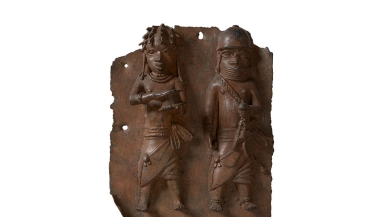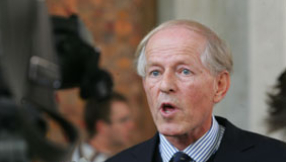
In what might prove to be a landmark decision, the Horniman Museum in Forest Hill, South London, has agreed to return its 'Benin Bronzes' to Nigeria. It's the first time a publicly funded museum in Britain has decided to do so and it comes at a time of increased concern about the ethics of keeping 'stolen' historical artefacts in museums.
The objects that the Horniman are returning will be permanently housed in a newly created state-of-the-art museum in Benin City, Edo State. The centre has been designed by the celebrated Ghanaian-British architect Sir David Frank Adjaye as a place "recalling lost collective memories" and one to instil an understanding of Nigeria's past civilisations and cultures.
Like most museums, the Horniman depends on local support and therefore needs to be sensitive to the community it serves. In this case, it is responding to a change we now see with people of Nigerian descent making up the largest diaspora in its locality.
It is also responding to a new awareness of Britain's colonial past, with the spotlight now turned on this area of British history. The result is that statues, memorials, and museum collections are being re-examined and reappraised. The return of the Benin Bronzes, brought to the Horniman in 1897 by the Victorian Tea Merchant, Frederick Horniman, is part of this general awareness.
Horniman was a Liberal MP and social reformer who built his tea business on forced indentured labour. This made the tea trade profitable and himself rich. His reforming zeal however, didn't extend to Indian labourers or African families; and when in 1897, the British forces overran the Kingdom of Benin, they burnt it to the ground, ransacked its royal household, looted its palaces, and sent the king into exile. Yet this didn't stop Horniman from buying a selection of the loot to display in his museum.
By its latest announcement, the Horniman Museum today is responding to the loud voices calling for a re-examination of historical objects whose antecedents are in question or dispute. It's therefore not surprising that it has decided to return its Benin Bronzes. It follows hard on the heels of Jesus College Cambridge's own decision to return the Okukor cockerel, several altarpieces, ivory, and ceremonial objects that it too has in its possession. The Ashmolean and Cambridge museums have agreed to follow suit and are returning over 213 objects. Glasgow's museums are also set to follow, and Germany and France have already transferred 1,100 artefacts and 26 treasures to their rightful owners.
The influence of the Black Lives Matter movement has added to this, and scores of memorials to slave traders and colonialists are now being scrutinised. Over 70 monuments of slave traders or colonialists have since been removed or are in the process of being taken down, and contentious street names, plaques, statues, and other memorials are now under review.
The 'wind of change' is also sweeping through the Church of England, and it is engaged in removing 'objectionable' objects and monuments from its churches. The Archbishop of Canterbury's Commission for Racial Justice, led by Lord Paul Boateng, seems to be leading the way and in its first report agrees that any statues, plaques and monuments associated with the slave trade should be removed from Anglican churches.
The report also says that the process in the Consistory Court that often makes these decisions should be simplified, as exemplified by the recent controversy surrounding the attempt to remove the monument of Tobias Rustat from the chapel of Jesus College Cambridge. The Lambeth Conference seems to go further, and calls for "holistic theologies, redemptive action and reparation".
Many of the statues and memorials in Britain today are a painful reminder of the country's colonial past, and often represent and glorify the people who perpetuated slavery and colonialism. The call for them to be removed has not always been met with universal approval, and many people have fiercely resisted it, arguing that the memorials represent the country's history, warts and all. Removing them would, they say, be to censor history. Others argue that they should be judged by the morality of the time and not by ours. We may find some of the things they said and did offensive, so the argument goes, but they are part of our collective past, and we should learn from them.
If only! Many of these statues and memorials tend to glorify as opposed to teaching us anything, and herein lies the problem. They tell us a half-truth or they lie, and they are hardly ever portrayed in their right historical context. Furthermore, many people from slavery and the colonial period could be better represented. There were those who fought for freedom, justice, and equality. Where are their statues and memorials? Where are those who fought and resisted slavery and colonialism? Why do we hear so little about them or hardly see any figure representing their sacrifice?
It's no wonder that in Britain today, black British kids find it hard to connect with the slave period of their descendants and are deeply ashamed of it. The other problem is that whenever they are told about it, it is never balanced, and their forebears are often shown negatively. They hardly ever hear that during slavery, the main problem that the slave master faced and which was a major threat to slavery - at first a profitable economic system - was the constant rebellion and resistance by slaves. In many ways, this then accounts for the brutal way they were treated in trying to break their spirit, as it was the only way to control them. It failed, and many people contributed to this, and that deserves our recognition.
We all need heroes, and British young people, black and brown, need them too. They need to see their heroes alongside what already exists, so that they can identify and feel proud. The result will go some way to righting a wrong, increasing confidence and self-esteem, and enabling all to feel part of a shared history.
Roy Francis is an award-winning former BBC 'Songs of Praise' producer and the author of 'Windrush and the Black Pentecostal Church in Britain'.













